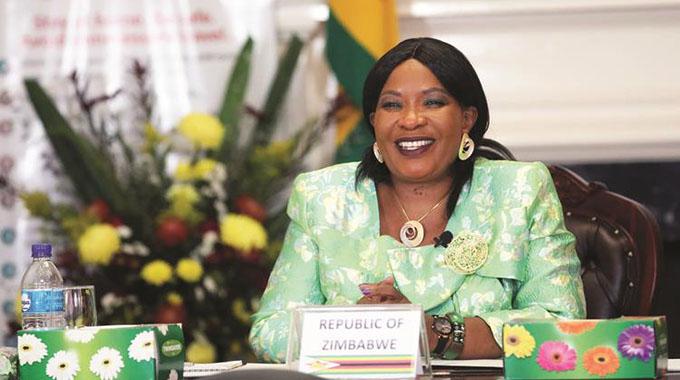Business / Economy
Auxillia Mnangagwa's rehab centre overwhelmed
08 Aug 2025 at 12:04hrs |
0 Views

The drug and substance abuse rehabilitation centre established by First Lady Auxillia Mnangagwa in Mbare is struggling to cope with demand, with hundreds of addicts on a waiting list seeking help, highlighting the growing substance abuse crisis in Zimbabwe.
The Angel of Hope Foundation's facility, which officially opened on July 12, already houses 90 clients less than a month later, with more than 600 applicants awaiting admission. The centre has a capacity of 200 inmates and provides free rehabilitation services to individuals battling addiction.
The centre offers a month-long programme that includes group therapy, counselling, and assessments aimed at reintegrating recovering addicts back into society. Health and Child Care Minister Douglas Mombeshora toured the facility on Wednesday and praised the rapid uptake of services.
"Having been opened only three weeks ago, it's already housing more than 90 clients, and its full capacity is 200. This is very, very commendable," said Mombeshora.
Angel of Hope has partnered with the Ministry of Youth Empowerment and Development to provide vocational training and youth services to graduates of the rehabilitation programme. However, with a waiting list exceeding 600, the foundation's administrator Charles Nyamukubva stressed the urgent need for more rehabilitation centres nationwide.
"We want to thank the First Lady, Amai Dr Auxillia Mnangagwa, for coming up with this idea," Nyamukubva said. "Because it's free, it's accessible to many. The programme is designed to keep participants engaged, especially since most have not completed their O' Level exams."
Minister Mombeshora lamented the widespread nature of drug abuse across the country and appealed to development partners to establish similar centres that prioritize affordability and accessibility.
"We have always advocated for partnerships with anyone willing to help build Zimbabwe," he said. "What I also urge is that these centres do not overcharge. Many people cannot afford high fees and will continue to suffer."
The government has launched a fundraising campaign aimed at setting up drug and substance abuse rehabilitation centres in every district, aiming to curb the growing menace. Mombeshora expressed optimism that combined government and non-governmental efforts will make a significant impact.
"With over 600 applications already, the Angel of Hope centre is well positioned to lead the fight against substance abuse in Zimbabwe," he noted.
Zimbabwe is grappling with increasing drug and substance abuse, particularly among youth frustrated by the country's challenging economic environment and scarce employment opportunities. The government has declared war on drug traffickers and users through a national anti-drug campaign titled No To Dangerous Drugs And Illicit Substances; See Something Say Something.
President Emmerson Mnangagwa has called for tougher penalties against drug abusers and the cartels supplying intoxicants, as reports indicate that admissions to mental health institutions increasingly involve teenagers battling drug addiction.
The overwhelming demand at Angel of Hope serves as a stark reminder of the scale of Zimbabwe's substance abuse challenges and the urgent need for sustained, collaborative intervention.
The Angel of Hope Foundation's facility, which officially opened on July 12, already houses 90 clients less than a month later, with more than 600 applicants awaiting admission. The centre has a capacity of 200 inmates and provides free rehabilitation services to individuals battling addiction.
The centre offers a month-long programme that includes group therapy, counselling, and assessments aimed at reintegrating recovering addicts back into society. Health and Child Care Minister Douglas Mombeshora toured the facility on Wednesday and praised the rapid uptake of services.
"Having been opened only three weeks ago, it's already housing more than 90 clients, and its full capacity is 200. This is very, very commendable," said Mombeshora.
Angel of Hope has partnered with the Ministry of Youth Empowerment and Development to provide vocational training and youth services to graduates of the rehabilitation programme. However, with a waiting list exceeding 600, the foundation's administrator Charles Nyamukubva stressed the urgent need for more rehabilitation centres nationwide.
"We want to thank the First Lady, Amai Dr Auxillia Mnangagwa, for coming up with this idea," Nyamukubva said. "Because it's free, it's accessible to many. The programme is designed to keep participants engaged, especially since most have not completed their O' Level exams."
"We have always advocated for partnerships with anyone willing to help build Zimbabwe," he said. "What I also urge is that these centres do not overcharge. Many people cannot afford high fees and will continue to suffer."
The government has launched a fundraising campaign aimed at setting up drug and substance abuse rehabilitation centres in every district, aiming to curb the growing menace. Mombeshora expressed optimism that combined government and non-governmental efforts will make a significant impact.
"With over 600 applications already, the Angel of Hope centre is well positioned to lead the fight against substance abuse in Zimbabwe," he noted.
Zimbabwe is grappling with increasing drug and substance abuse, particularly among youth frustrated by the country's challenging economic environment and scarce employment opportunities. The government has declared war on drug traffickers and users through a national anti-drug campaign titled No To Dangerous Drugs And Illicit Substances; See Something Say Something.
President Emmerson Mnangagwa has called for tougher penalties against drug abusers and the cartels supplying intoxicants, as reports indicate that admissions to mental health institutions increasingly involve teenagers battling drug addiction.
The overwhelming demand at Angel of Hope serves as a stark reminder of the scale of Zimbabwe's substance abuse challenges and the urgent need for sustained, collaborative intervention.
Source - Newsday
Join the discussion
Loading comments…


































